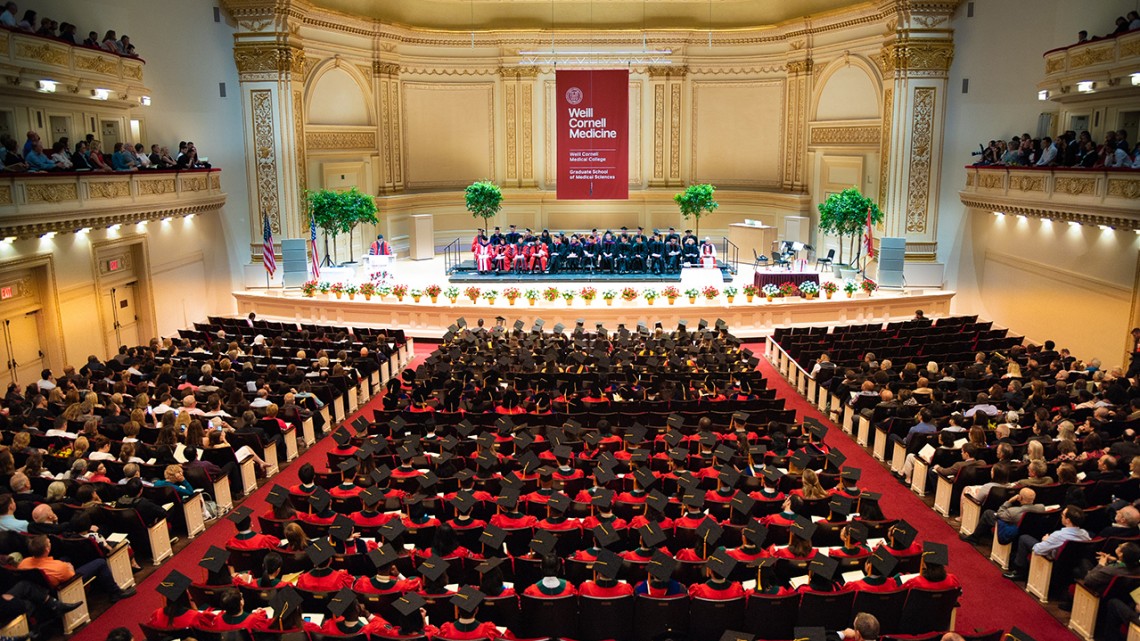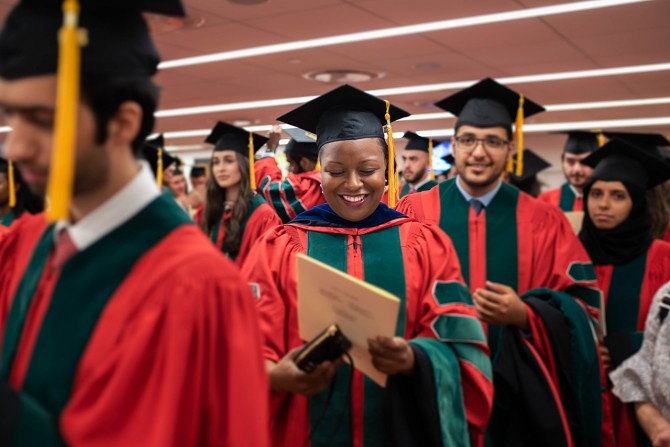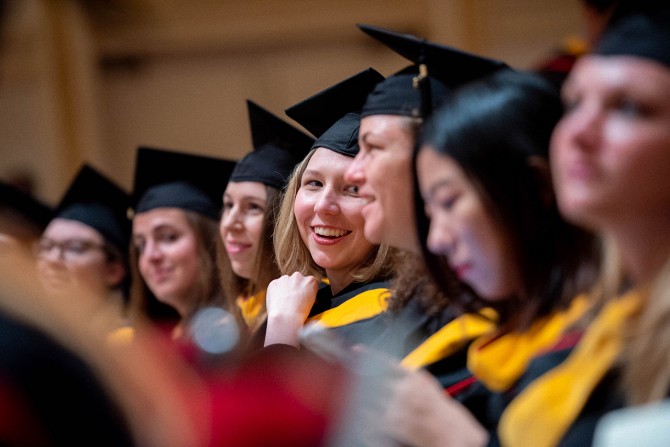
The Class of 2018 from Weill Cornell Medicine is honored May 31 at Carnegie Hall.
Commencement honors future health care leaders
By Kathryn Inman Jamie Kass Alyssa Sunkin-Strube
For most of his life, Vishal Patel wanted to be a teacher. But midway through college, he discovered a love for medicine and realized he could combine those two passions by becoming a physician. That journey reached a milestone on May 31 with Patel’s graduation from Weill Cornell Medical College in front of his family – 12 members in all – who celebrated his crossing Carnegie Hall’s iconic stage by brandishing large cardboard cutouts of his face.
Soon, Patel will head back to his home state of California for a residency in otolaryngology at UCLA, but on the day of his commencement, he was feeling contemplative. The ceremony allowed him to reflect on his time at Weill Cornell Medicine and what lies ahead.
“I’m ready to continue moving forward, learning more, having more responsibility and furthering my medical career,” he said. “Mostly, I’m looking forward to the opportunity to have a real impact on patients – that’s what’s most exciting. We get to take care of people.”
Patel was among 289 students – 89 fellow medical doctors from New York, 34 from Qatar, 56 Ph.D.s, 34 physician assistants and 76 with Master of Science degrees – in the Class of 2018 who graduated from Weill Cornell Medicine. Vibrant red and white bouquets lined the Perelman Stage as Cornell President Martha E. Pollack joined Deans Augustine M.K. Choi, Carl Nathan and Javaid I. Sheikh in conferring degrees on students graduating from Weill Cornell Medical College, Weill Cornell Graduate School of Medical Sciences and Weill Cornell Medicine-Qatar.
With their education behind them, the graduates will now embark on their residencies, postdocs, fellowships and other phases of their careers. But no matter where they go or what they do, Choi said, they need to remember what inspired them to pursue careers in medicine and science, and hold true to those ideals.
“You know firsthand that scientific discoveries lead to cures and help to improve quality of life for people around the globe,” said Choi, the Stephen and Suzanne Weiss Dean at Weill Cornell Medicine and provost for medical affairs of Cornell University. “You represent compassion and integrity, and you have a responsibility to try to make society better for everyone, and particularly for those most in need of care. The impact you have extends far beyond yourselves, and I urge you to take seriously your ability to improve the communities and organizations around you.”
Indeed, those who commit their lives to medicine have a special, earned privilege, Pollack said. While some careers are exemplified by interactions that are transactional, medicine and science are at their cores about fostering trust and deep human bonds.
“So my advice to you is this: Use your privilege well. Respect it. Remember that your work must always be about those in your care and those whose lives you are meant to improve, and not about you,” she said.
With that privilege come responsibilities – to help cure disease and make those cures accessible to those who need them, to defend science and reason, to teach future students, and to shed light on the unknown, said Nathan, dean of the Weill Cornell Graduate School of Medical Sciences.
“The diploma you are about to receive is a symbol of the power you’ve proved that you have. Go use your power wisely,” he said. “Then come back and tell us what you’ve done. Like your parents, partners, family and friends, your teachers and advisers are proud of the stories you are writing with your lives. All of us are eager to hear the chapters to come.”
Graduate school commencement speaker Dr. Aaron Chang’s next chapter will include the role of postdoctoral associate at Pfizer, where he will study cancer immunology. He urged his fellow graduates to harness the curiosity and tenacity that led them to join the scientific community to make a difference in the world.
“Together, let’s take our training and forge a new future in research, health care and medicine,” he said. “Let us embody the concept of bench to bedside, where research directly applies to decisions in the clinic, and bedside to bench, where observations made in the clinic are mechanistically dissected in the lab to refine treatment strategies. This is a new era in science and health care, and we must cooperate to bring the benefits to humanity.”
The new graduates must also stay united, working together toward a common goal: to solve the world’s most intractable health care challenges. While Weill Cornell Medicine-Qatar and Weill Cornell Medicine in New York are separated by a “couple of billion gallons of ocean water,” said Qatar commencement speaker Dr. Mu Ji Hwang, medical school trainees at both locations share similar experiences, goals and challenges. He said that connection gives him strength – and reminds him about the power that inclusivity can have on improving the health and well-being of others.
“I believe we, the Class of 2018, stand as the culmination and living embodiment of how far cooperation can take us and how much more we stand to gain as a collective whole,” said Hwang, who will complete his residency in neurology at NewYork-Presbyterian/Weill Cornell Medical Center. “And in this day and age, with divisive and polarizing rhetoric sweeping the globe, it becomes incredibly important to look at one another and see similarities, not differences.”
And just as the graduates will give back to humanity, they too should consider the next generation of health care leaders that will come after them, said medical college commencement speaker Dr. Benjamin Gordon. They have a special obligation to teach and mentor future talents – just like the professors, attendings, residents and postdocs who taught them in medical and graduate school.
“Our profession is unlike others in many ways, but one of the big ones is this: it’s predicated on the goodwill of the more experienced bestowing knowledge and behaviors onto those behind them, usually without any actual incentive, just the sense of duty instilled by the fact that someone had done the same thing for them years before,” said Gordon, who will complete a residency in internal medicine at NewYork-Presbyterian/Weill Cornell. “So I encourage you, wherever you go – whether in academia, leading rounds with residents and medical students; in research, hosting lab meetings with Ph.D.s; or in private practice, mentoring younger colleagues – teach, and teach like you’d want to be taught.”
Dr. Nahel Altaf Tunio left her home in Pakistan to get a medical education at Weill Cornell Medicine-Qatar when she was just a teenager. Now, at the age of 24, she’s about to embark on another journey, moving to the United States for a residency in internal medicine at Case Western Reserve –UH Cleveland Medical Center.
“Attending medical school at Weill Cornell Medicine-Qatar was the best decision I ever made,” said Tunio, who met her husband while studying at Weill Cornell Medicine in New York. “Moving to a country with a completely different culture shapes you as a person and makes you more independent. I found my career and my love through Weill Cornell Medicine.”
Weill Cornell Medicine associate editor Kathryn Inman, science writer Jamie Kass and newsroom manager Alyssa Sunkin-Strube contributed to this story.
Media Contact
Get Cornell news delivered right to your inbox.
Subscribe



